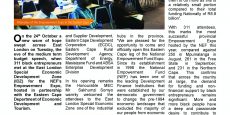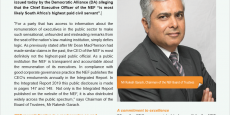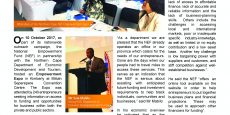NEF Secures Clean External Audit for 12th Year Running
As a legal requirement the National Empowerment Fund (NEF) is obliged to table its Integrated Report every year before Parliament through its line Ministry, the dtic. This year, and in compliance with this regulatory obligation, the NEF must submit copies to the Parliamentary Office for tabling by 23 August 2017.
Writing in the publication’s foreword, Trade and Industry Minister, Hon. Dr Rob Davies, says: “This Integrated Report 2017 of the NEF outlines the seminal achievements that the development financier has continued to make in pursuit of this critical historic mission, leading to cumulative life-to-date approval of R8.6 billion for the benefit of 852 black entrepreneurs countrywide”.
Recapitalisation
He says efforts are “underway to ensure that the NEF, as an apex institution, will soon be recapitalised as a subsidiary of the Industrial Development Corporation (IDC) in order to meet the considerable demand for funding by black entrepreneurs. Government applauds the NEF for having developed formidable human capital across its echelons, and for retaining exceptional skills under trying conditions in respect of yet unrealised recapitalisation, and for delivering meaningful impact in driving economic growth and transformation across industries and the country as a whole”.
“As an organisation that serves society,” says Chairman of the Board of Trustees Mr Rakesh Garach, “one whose fundamental import is to bridge the economic divide between two distinct historical epochs and across deep social chasms, the NEF board understands and subscribes to inclusive and integrated governance that aspires to ensure integrity and uphold sustainability”.
In addition to the anticipated IDC recapitalization, adds Mr Garach, “the NEF has been in discussions with the Public Investment Corporation (PIC) in order to secure a R1 billion facility from the funds that the PIC manages on behalf of the Unemployment Insurance Fund (UIF). The NEF has also had warm and encouraging engagements with the UIF, and there is broad agreement that because the work of the NEF contributes directly to the country’s job-creation imperative, the development financier would be an ideal partner with the UIF”.
Human capital
Reports NEF CEO, Ms Philisiwe Mthethwa: “One of the NEF’s proudest achievements is the quality of its human capital, made up of executives, managers, investment and support professionals who come from across the length and breadth of South Africa. Among these patriots are Chartered Accountants, Engineers, Admitted Attorneys and professionals from various spheres.
70% of the NEF’s staff complement is in the core investment divisions, which are the engine rooms that are responsible for the implementation of the specialised mandate of the NEF. While this staff complement is maturing, at an average 38 years the NEF’s human capital of 157 employees is an investment in the future and represents continuity of the organisation, with an optimal projected headcount of 176 by year-end in 2018, in anticipation of recapitalisation and increased dealflow”.
Performance highlights
She says among the key highlights during the year under review, the NEF approved 82 deals worth R1.1 billion against a target of 103 deals worth R750 million. What this means is that NEF-resourced deals amount to R552 million against a target of R450, and resulting in the target being exceeded by 22%. The balance of the approved amount comprises transactions funded by the Department of Rural Development and Land Reform (DRDLR), valued R515 million against a target of R300 million, which exceeded the target by 72%”.
“Transactions with high jobcreation impact are a key strategic focus of the NEF,” adds the CEO, “and provide greater discount values for investee businesses as an incentive for entrepreneurs to employ more people as long as this imperative is commercially sustainable. Accordingly, the NEF supported 5 069 job opportunities, of which 2 841 were new, outstripping target by 49%. This brings total job opportunities geared to be supported since inception in excess of 92 000, of which 63 000 are new”.
Transforming the financial sector
A key highlight of the NEF during the year under review was submission of extensive input jointly to the Standing Committee on Finance and the Portfolio Committee on Trade and Industry, when Parliament hosted public hearings on the transformation of the financial sector in South Africa.
Following a diagnostic review of the history of economic transformation in South Africa, the NEF analysed the top 17 JSE-listed financial services companies that have concluded B-BBEE deals, which transactions are still live. The NEF study “shows that the financial service sector companies have achieved an average of 6% against the direct equity target of 10%. This is under-performance remains a challenge because the sector has not met its set targets as per the charter,” adds the CEO’s report.
The NEF submission to Parliament made concrete recommendations on a number of areas, including increased empowerment financing by the sector, increased partnership between DFIs and commercial lenders in order to provide project development funding to black industrialists and entrepreneurs. Also critical is the need to utilize preferential procurement as an anchor to transformation, as well as the introduction of measures to prevent value leakage “such as transfer pricing, an unscrupulous practice that undermines the objectives of transformation by diluting the real value that accrues to black people in BEE transactions,” explained the CEO.
In respect of the establishment of a Black Bank, “the NEF’s calculation is that initial capital required for the establishment of a Black Bank is R306m, among other purposes to acquire a licence and to build infrastructure. The bank could be owned 49% by government, which could provide the initial R150 million seed capital, while the remaining R156 million could be raised from the black public, who would own 51% of the entity. Resource mobilisation among the black public can be modelled along the lines of successful initiatives like the Initial Public Offer of the NEF’s own Asonge Share Scheme,” added Ms Mthethwa.
Clean audits
Chief Financial Officer, Ms Innocentia Pule, says “for 12 years in succession the NEF has reported on the basis of clean external audit opinions, which demonstrates the organisation’s integrity and financial management acumen. The standards that we set for the NEF are the same that we hold our investees to, and it is for this reason that in striving for excellence, the NEF provides a suite of measures to improve the sustainability and growth of its investees. These include businessplanning support, entrepreneurial training, incubation and mentorship support, at no cost to investees. It is for this reason that many have come to acknowledge the NEF as a funder with a soul”.






